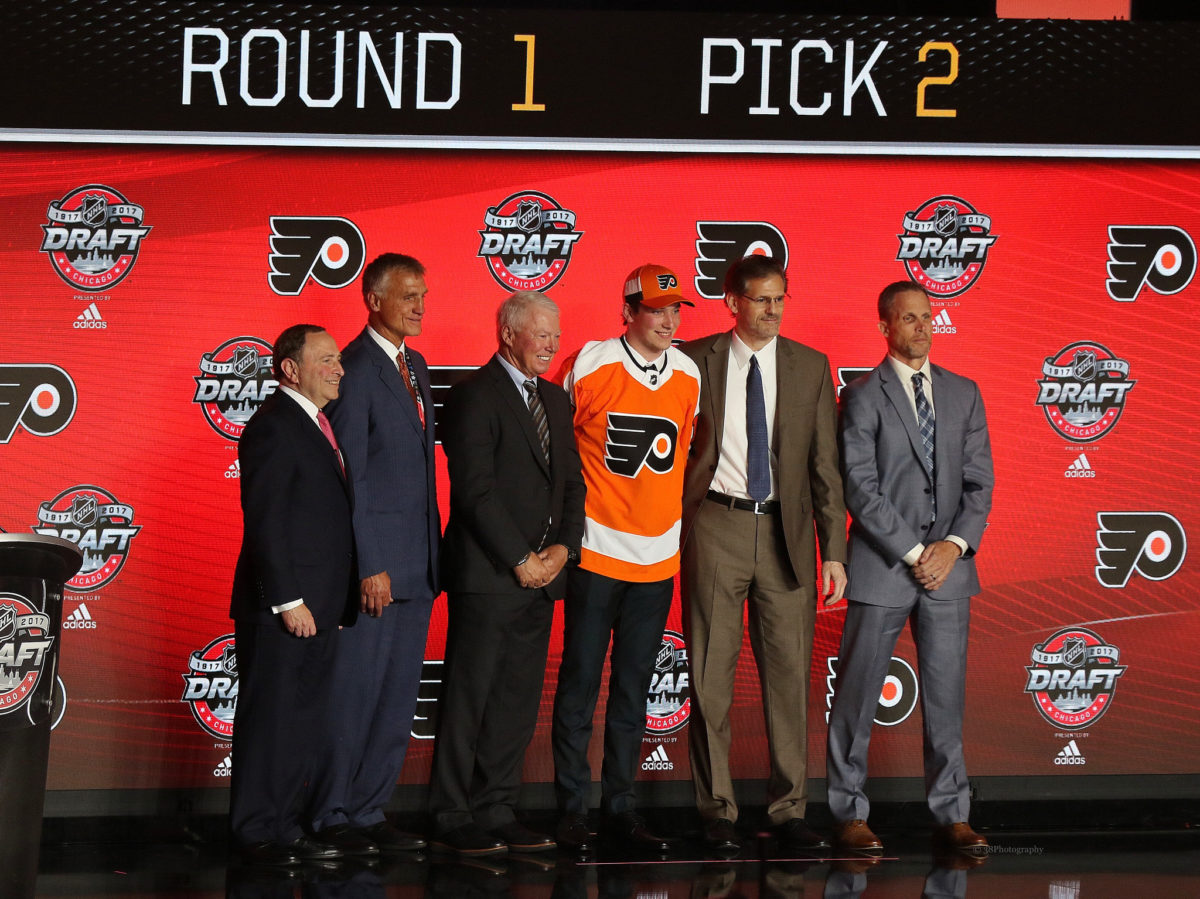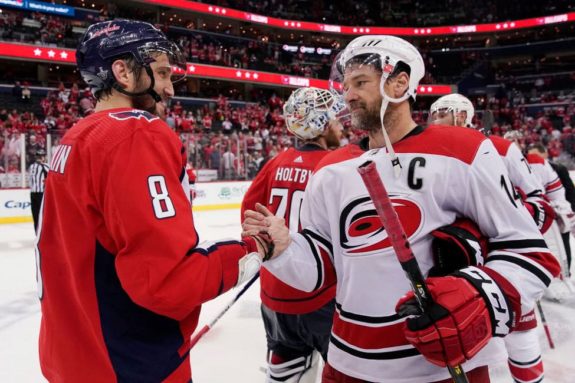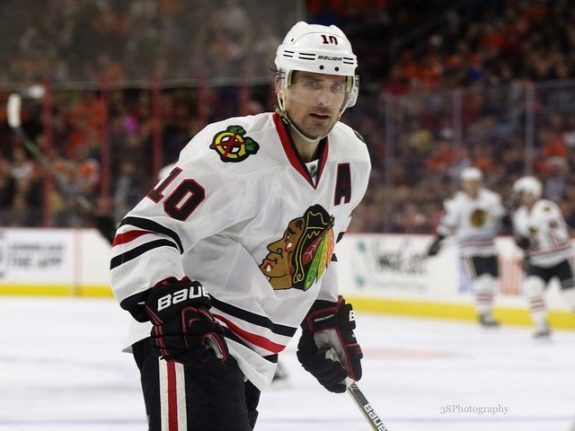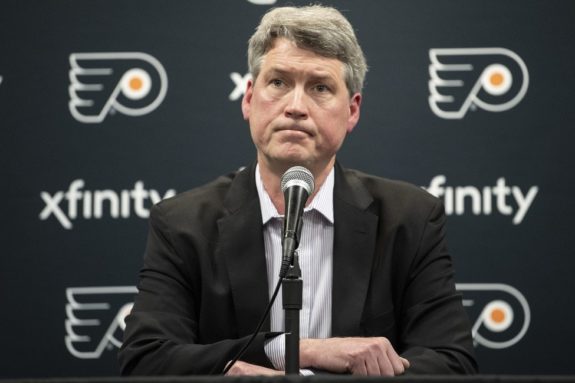Flyers general manager (GM) Chuck Fletcher sent former second-overall pick Nolan Patrick, along with defenseman Philippe Myers, to the Nashville Predators on Saturday for 30-year-old blueliner Ryan Ellis. Patrick was immediately flipped to the Vegas Golden Knights for Cody Glass, who was selected just four picks behind him in the 2017 NHL Entry Draft. He will look to regain his footing in the NHL after an ultimately disappointing tenure of unfulfilled expectations with the Flyers. The move will reunite him with Vegas GM Kelly McCrimmon, who owned the Brandon Wheat Kings of the Western Hockey League while Patrick starred there as a junior prospect.
Patrick joins a considerable list of developmental failures in the organization who have been traded early in their careers. Players who have greatly benefited from these changes in scenery most notably include Justin Williams, Patrick Sharp, and Sergei Bobrovsky. Each of the three brought minimally valuable returns back to the Flyers.
Patrick’s Disappointing Tenure with Flyers
The Flyers won the draft lottery in 2017 and moved from the 13th-overall pick to the second. The opportunity to draft Patrick seemed like the big break the organization was waiting for. He and Nico Hischier, who was selected first by the New Jersey Devils, were considered the best two prospects in a top-heavy draft. Patrick brought flashes of potential during his 2017-18 and 2018-19 seasons, but never established him as a legitimate offensive force. He totaled 70 points in 197 games, and he was significantly more effective in the second half of both seasons.
Serious questions about Patrick’s future arose when he missed the entire 2019-20 season due to symptoms from a migraine disorder. The bizarre and unfamiliar nature of the situation made it difficult for anyone outside the organization to gain a true understanding of it. The Flyers won their first playoff series in eight seasons while Patrick did not appear in a regular season or playoff game. Miro Heiskanen, Cale Makar, and Elias Pettersson, the three players picked consecutively after Patrick in 2017, all blossomed into NHL stars.

His return in 2020-21 didn’t go well. Patrick finished with just nine points in 52 games, despite persistent efforts from head coach Alain Vigneault to give him opportunities on the power play. His minus-30 rating was tied for the second worst in the NHL. Frank Seravalli, formerly of TSN Canada, reported that he “could certainly see Nolan Patrick on the list of players this summer who ask for a fresh start elsewhere” after Patrick changed agents following the season.
He still holds tremendous potential to break out with the Golden Knights, and some are left to wonder if the Flyers gave up too soon. It is fair to speculate whether or not he will become the next big regret of an organization that has seen plenty of them. Myers also finds himself in a similar situation.
Irony Drives Flyers Narratives
Success of a player who has left an organization doesn’t technically affect his former organization, but it frequently drives ironic storylines that jump out to fans and media. The Flyers know the tales as well as anybody, and a 46-year Stanley Cup drought doesn’t exactly inspire patience and optimism.
Williams, Philadelphia’s first-round pick in 2001, was traded in 2004 for defenseman Danny Markov. Dealing a 19-year-old struggling to fit into a system for a veteran who immediately patched up a roster hole made sense in the short term. Markov played key minutes for the Flyers in their run to Game 7 of the Eastern Conference Final against the upstart Tampa Bay Lightning in 2004, but never returned to the organization afterwards.

The long-term success of Williams on hockey’s biggest stages made the Flyers regret the move. He won three Stanley Cups and a Conn Smythe Trophy in 16 NHL seasons following the trade, and his 15 career Game 7 points still stands as an NHL record. A majority of his accomplishments came during periods of minimal success for the Flyers.
Sharp, Philadelphia’s third-round pick in 2001, requested a trade during the 2005-06 season because of consistently lessening ice time and a lack of favor from former head coach Ken Hitchcock. He was dealt to the Chicago Blackhawks for Matt Ellison, who played only seven games with the Flyers, and a third-round pick that was quickly dealt away.
The irony of Sharp’s initial success in Chicago is that it came at the expense of his former team. The Flyers, in their only appearance in the Stanley Cup Final during the 21st century, lost to the Blackhawks in 2010. Sharp recorded six points in six games during the series. He continued as a key contributor for the Blackhawks during their six-year stretch of dominance that ultimately yielded three Cups. He finished with 86 points in 130 playoff games in his career after leaving the Flyers.

The Bobrovsky trade in June 2012 drove the continuing narrative of Philadelphia as a goalie graveyard. It brought back three draft picks from the Columbus Blue Jackets that ultimately had little impact on the organization. The trade was largely based on a vote of confidence in goaltender Ilya Bryzgalov, which proved to be a flat-out disaster. The two netminders went in opposite directions in 2012-13. Bobrovsky won the Vezina Trophy in his first season in Columbus, and Bryzgalov received a compliance buyout the following summer. The irony goes further when considering how the Flyers acquired Steve Mason from Columbus as Bryzgalov’s replacement. Bobrovsky went on to win another Vezina in 2016-17, while Mason was up and down in 231 games with the Flyers.
Hextall, Fletcher Provide New Direction in Philadelphia
The Flyers dug themselves into an unfavorable situation before hiring GM Ron Hextall in 2014. An organization that previously spent heavily and essentially tried to compete for a Stanley Cup on an annual basis needed a change in philosophy. Hextall preached patience and favored drafting and developing rather than short-sighted moves to deal players in situations similar to Williams, Sharp, and Bobrovsky.
To some extent, the approach worked because of the promising young players that he drafted who are currently on the Flyers roster. He also showed an unwavering commitment to center Sean Couturier through his slow development, and the patience paid huge dividends for the 2020 Selke Trophy winner. A similarly successful approach was taken during the development of forward Scott Laughton.
So, what made Patrick’s case different? Hextall’s patience was intended to provide the Flyers with organizational currency that they didn’t have when he was hired. As his replacement, Fletcher now has flexibility to move young players like Patrick and Myers to bring back coveted, reputable veterans like Ellis because of Hextall’s accumulation of trade assets. The move doesn’t truly indicate a lack of faith in prospect development or an inability to learn from the past. The departure of Patrick paves a clearer path for prospect Morgan Frost, and Myers’ absence will allow more opportunity for prospects Cam York and Yegor Zamula.

Philadelphia is home to one of the most passionate fan bases in professional sports. Fans have seen the failure of their MLB team in drafting Mickey Moniak first overall, and they’re forced to watch former top pick Ben Simmons struggle in the NBA. It’s fair for the fans to question the Flyers based on the unfulfilled expectations of Patrick and the precedent cases of the organization letting young talent get away too soon. The success of Ellis in a Flyers uniform will forever be judged based on the careers of Patrick and Myers.
That doesn’t change the fact that it was necessary for Fletcher to use the accumulated organizational currency to fill an immediate need in the short-term by making the move for Ellis.